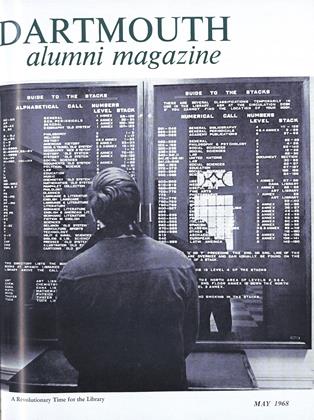"I sometimes wear two collars as well as two Hats," explains THEODORE V. PURCELL '33, a Jesuit priest and expert in labor relations and organizational psychology. Father Purcell occasionally switches his clerical garb for a business suit to discuss blue collar problems with management.
Former arctic explorer, utility salesman, author, teacher, and William Jewett Tucker Foundation Lecturer at Dartmouth, this personable and perceptive man is a founder and now Director of the mostly Jesuit-staffed Cambridge Center for Social Studies. CCSS is an independent social science research community concerned with contemporary values and value conflicts. The Center is a derivation of the Institute of Social Order in St. Louis which he directed from 1962 to 1965 and has counterparts in India, Chile, Paris, Africa, and Hong Kong.
"When I signed up with the Jesuits in 1936, nobody was more surprised than myself," says Father Purcell. But he found Thomist theology "neither dusty, medieval, nor anti-scientific as I had always suspected any kind of theology of being." He was ordained in 1945.
Father Purcell and his associates at the Center - all experts with practical backgrounds and books to their credit - are studying problems in equal employment opportunity, unemployment insurance, labor arbitration, management attitudes and practices, and business concern for public financing.
"We need research know-how to tell us more about the nature of problems and about long-run solutions," he says. "We can't just apply bandages to a faucet that leaks."
The Ford Foundation has awarded the Center a $90,000 grant to finance a two-year study of management social responsibility and racial employment in the electrical industry. Father Purcell explains that the industry was selected because it is diversified and one of the largest single basic industries in the United States and is found in about two-thirds of all other basic industries.
He sees the study as vital in view of the report of the President's national advisory commission on civil disorder, which states: "Pervasive unemployment and underemployment are the most persistent and serious grievances in the Negro ghetto. They are inextricably linked to the problem of civil disorder."
Though Father Purcell holds four advanced degrees - an A.M. in economics and a Licentiate in Theology from Loyola University and an A.M. and Ph.D. in social and industrial psychology from Harvard - his secular experience and on-the-job research give more than academic credence to his writing and teaching. He is perhaps best known in the field for his 1953 book The Worker Speaks His Mind onCompany and Union, the results of 44 months of living and talking with Swift & Co. meat-packers in Chicago's Packingtown. A second book, Blue CollarMan, was also published by Harvard University Press in 1960, and he wrote more than a dozen articles in journals and chapters'in books while teaching psychology at Loyola.
When he was Tucker Foundation Lecturer at Dartmouth - the first priest on the faculty - he taught the psychology of industrial relations, a seminar in philosophical psychology, and "Business and Society" at Tuck.
He says he was glad to join Dartmouth's tradition of student-faculty contacts. "Nearly every Thursday night I had a 'talkfest' in my rooms with students sitting on the floor around the fireplace. With the aid of coke, beer, cheese, and pretzels we would solve the problems of the world, or just engage in the lighter talk of student life. These Thursday nights were among my most pleasant experiences at Dartmouth. I think the students will remember them, too."
He has maintained professional contact with Tuck and participated in a recent Conference on Business in American Society sponsored by Tuck and Daedalus, the journal of the American Academy of Arts and Sciences.
Father Purcell is concerned most with the whole concept of corporate social responsibility, but remarks, "Business is not a welfare organization. It has to make a profit." A pretty realistic statement from a man who has taken a vow of poverty.
 View Full Issue
View Full Issue
More From This Issue
-
 Feature
FeatureThe Making of a Primary Winner
May 1968 By WINTHROP A. ROCKWELL '70 -
 Feature
FeatureDartmouth's Alumni Relations
May 1968 -
 Feature
FeatureThe Library Revolution
May 1968 By Clifford L. Jordan '45 -
 Article
ArticleOxford Revisited
May 1968 By JOHN G. GARRARD, -
 Article
ArticleThe Undergraduate Chair
May 1968 By JOHN BURNS '68 -
 Class Notes
Class Notes1941
May 1968 By EARL H. COTTON, ROBERT G. THOMAS
Article
-
 Article
ArticleDARTMOUTH
December, 1919 -
 Article
ArticleHistoric Event of 50 Years Ago
October 1954 -
 Article
ArticleThe 1966 Joshua A.
MAY 1967 -
 Article
ArticleWhat Rold Do Schools Like Dartmouth Play in World Affairs?
APRIL 1992 -
 Article
ArticleA Hard Job of Education A Hard Job of Education
June 1946 By JOHN W. FINCH -
 Article
ArticleHarry Ellinger
March 1942 By The Editor

